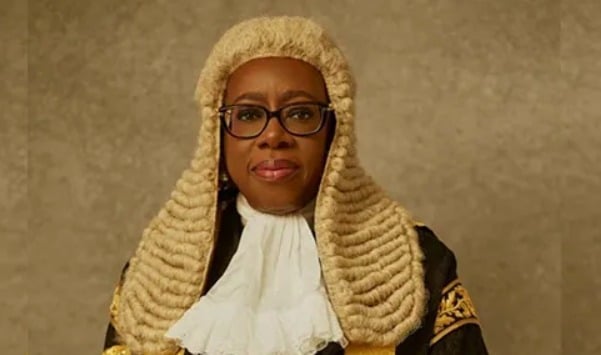Kudirat Kekere-Ekun
Senior lawyers and leaders of civil society organisations (CSOs) have asked Kudirat Kekere-Ekun, justice of the supreme court, to use her tenure as the incoming chief justice of Nigeria (CJN) to elevate the standards of Nigeria’s judiciary.
Olukayode Ariwoola, the incumbent CJN, will bow out of office on August 22, having attained the mandatory retirement age of 70.
Ariwoola will be succeeded by Kudirat Kekere-Ekun, the next most senior justice of the apex court, in an acting capacity, pending her confirmation.
During a round table on Tuesday, stakeholders noted that Kekere-Ekun is taking over “at a time when the judiciary confronts far-reaching challenges to its authority and reputation”.
Advertisement
The roundtable was organised by the TAP Initiative for Citizens Development, CSO, in collaboration with the Network of University Legal Aid Initiative (NULAI), to evaluate the state of the nation’s judiciary.
Some of the speakers at the roundtable included two professors of law and senior advocate of Nigeria (SAN), Ernest Ojukwu; Samuel Erugo; and Aisha Yesufu, a human rights activist.
Martin Obono, the Tap Initiative’s executive director, said the session was convened to offer recommendations necessary for judicial reforms.
Advertisement
“As an organisation and individuals, we seek to contribute to the distillation of this agenda,” Obono said.
Obono said the new CJN must be ready to address the problem of abuse of interim injunctions and ex-parte orders as well as conflicting judgments by implementing clear guidelines and improving judicial coordination.
He said discipline and accountability should be enhanced within the judiciary, while “the crisis of political cases, election petitions, and judicialisation of politics” should be tackled.
Obono equally called for the reform of the supreme court.
Advertisement
Mojirayo Ogunlana, the executive director of Digicivic Initiative, said the success of the incoming CJN’s administration depends on effective strategies that would be put in place to reform the judicial sector and ensure public trust.
“Achieving this, however, will require you as the CJN to assure action and delivery on a minimum core of issues and challenges, many of which have been outlined in this briefing,” Ogunlana said.
“As you assume office, my lord chief justice, a robust reform agenda is essential to elevate the judiciary’s standards of justice.
“This agenda should focus on ensuring merit-based appointments as mandated by section 23 1 of the Constitution, to combat historical nepotism exemplified by the immediate past chief justice.
Advertisement
“Enhancing structural and procedural efficiency is also crucial, in line with Sections 231 and 292, by investing in ongoing training for justices in emerging fields like information technology and artificial intelligence.
“Integrating modern technology, supported by section 36(1), will streamline court processes and reduce delays through digital systems and virtual hearings.
Advertisement
“Addressing issues of conflicting judgments and interim injunctions requires clear guidelines and improved coordination, as highlighted in Sections 6 and 36, to ensure consistency and fairness.
“Engaging stakeholders such as legal practitioners, civil society, and the public will provide valuable input and support for these reforms.
Advertisement
“By implementing these changes, you can restore public confidence, strengthen the rule of law, put the judiciary on track to be a more transparent and effective institution, and guarantee a legacy that will be evergreen at the end of your tenure.”
Advertisement
Add a comment









